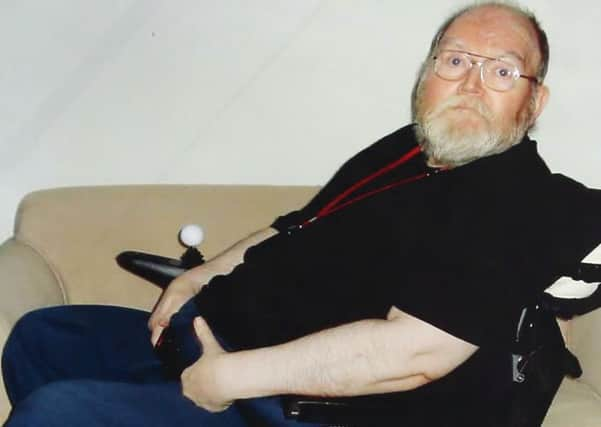Obituary: Gordon Ross, television producer and right to die campaigner


Despite his considerable infirmities Gordon Ross remained positive and spearheaded the legal battle for his right to die. He was Scotland’s most prominent campaigner to seek legal guidance on assisted suicide.
Ross was unable to attend a Court of Session hearing in Edinburgh in May last year at which he sought clarification over whether anyone who helped him to take his life would then face prosecution. His counsel said the ruling was “urgently required” as his condition was deteriorating. Aidan O’Neill QC asked the Lord Advocate to issue guidance as to anyone who gave him assistance would not be charged with an offence.
Advertisement
Hide AdAdvertisement
Hide AdRoss argued forcibly that he was being discriminated against as if he wanted to end his own life he would need assistance which would land them in trouble. He said: “I believe that, as a disabled person, I am currently being discriminated against. Anyone else, in any circumstances, can choose to end their own lives at any time. Because of my disability that is something I am unable to do. I want to know what action the law might take were someone to assist me.”
Ross had multiple health problems, had been diagnosed suffering from Parkinson’s in 2005, was confined to a wheelchair, and had been admitted to hospital in Glasgow with pneumonia.
In May last year Ross brought his case to the Court of Session asking for “a dignified suicide”. In a written judgment issued in September, Lord Doherty ruled that the current Crown policy was legal and did not breach the European Convention on Human Rights. Ross launched an appeal against this decision in December before the Lord Justice Clerk, Lord Carloway, sitting with Lady Dorrian and Lord Drummond Young.
At the hearing last May, when demonstrators of Friends At The End (FATE) campaigned outside the court, it was made clear to the court that Ross was unable to walk and could not feed or dress himself. His legal team argued that the lord advocate’s “failure” to produce guidelines was incompatible with his rights under the European Convention on Human Rights.
Sheila Duffy, convener of FATE said outside the court, “Despite his numerous health problems which would have floored a lesser individual, Gordon worked tirelessly to support the assisted dying cause, and never lost his sense of humour.”
In a varied career, Ross had been a civil servant in the Department of Pensions and National Insurance, and also worked in television production.
To the end of his life he remained active and alert. He was much admired by friends in both FATE and the Humanist movement for his kindly advice and generous spirit. Ross maintained a lively interest in political and social affairs – especially in Scotland. He was a devoted member of Humanist Society Scotland and had served as treasurer of the society.
Ross is survived by his wife, and family.
An earlier version of this article contained a passage which confused the deceased with television cameraman Gordon Ross, who is alive and well. We apologise unreservedly to Mr Ross for any upset or confusion caused, and we are happy to confirm that he continues to operate as an independent cameraman with i2i Television, based in Scotland. www.i2itv.com